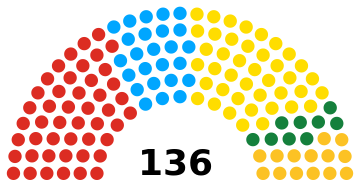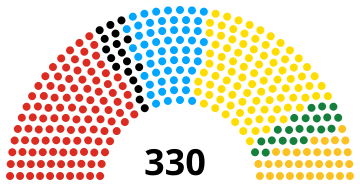
Romania's political framework is a semi-presidential representative democratic republic where the Prime Minister is the head of government while the President, according to the constitution, has a more symbolic role, is responsible for the foreign policy, signs certain decrees, approves laws promulgated by the parliament, and nominates the head of government. Romania has a democratic, multi-party system, with legislative power vested in the government and the two chambers of the Parliament, more specifically the Chamber of Deputies and the Senate. The judiciary is independent of the executive and the legislature. From 1948 until 1989, the communist rule political structure took place in the framework of a one-party socialist republic governed by the Romanian Communist Party (PCR) as its only legal party.

The Social Democratic Party is the largest social democratic political party in Romania and also the largest overall political party in the country, aside from European Parliament level, where it is the second largest by total number of political representatives, after the National Liberal Party (PNL). It was founded by Ion Iliescu, Romania's first democratically elected president at the 1990 Romanian general election. It is currently part of the National Coalition for Romania (CNR), which is a big tent grand coalition comprising also the National Liberal Party (PNL). The CNR formerly included the Democratic Alliance of Hungarians in Romania (UDMR/RMDSZ) until mid June 2023.

The National Liberal Party is a social-conservative political party in Romania. Re-founded in mid January 1990, shortly after the Revolution of 1989 which culminated in the fall of communism in Romania, it claims the legacy of the major political party of the same name, active between 1875 and 1947 in the Kingdom of Romania. Based on this historical legacy, it often presents itself as the first formally constituted political party in the country and the oldest of its kind from the family of European liberal parties as well.

The Chamber of Deputies is the lower house in Romania's bicameral parliament. It has 330 total seats to which deputies are elected by direct popular vote using party-list proportional representation to serve four-year terms. Additionally, the organisation of each national ethnic minority is entitled to a seat in the Chamber.
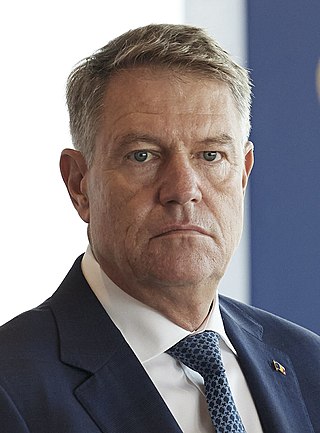
Klaus Werner Iohannis, sometimes referred to by his initials KWI in the Romanian press, is a Romanian politician, physicist, and former physics teacher who has been serving as the president of Romania since 2014. He became the president of the National Liberal Party (PNL) in 2014, after previously serving as the leader of the Democratic Forum of Germans in Romania (FDGR/DFDR) between 2002 and 2013. Prior to entering national politics, he was a physics teacher at the Samuel von Brukenthal National College in his native Sibiu.

Dacian Julien Cioloș is a Romanian agronomist who served as Prime Minister of Romania from November 2015 to January 2017. He previously served as Agriculture Minister under Călin Popescu-Tăriceanu between October 2007 and December 2008. In November 2009, European Commission President José Manuel Barroso nominated him to be the next Agriculture Commissioner, a position he assumed in February 2010 and held until his term expired in November 2014. In November 2015, President Klaus Iohannis named him Prime Minister; Cioloș assumed office after receiving approval from Parliament.

Parliamentary elections were held in Romania on 11 December 2016. They were the first held under a new electoral system adopted in 2015, which saw a return to the proportional electoral system last used in the 2004 elections. The new electoral legislation provides a norm of representation for deputies of 73,000 inhabitants and 168,000 inhabitants for senators, which decreased the number of MPs.

The Alliance of Liberals and Democrats was a minor nominally liberal political party in Romania which was officially absorbed in its entirety by the National Liberal Party (PNL), from which it initially seceded in 2015, during late March 2022. Throughout its relatively short political history, it was mostly associated with the Social Democratic Party (PSD) at governance, firstly between 2014 and 2015 and the once more for the last time between 2017 and 2019.

The Save Romania Union is a liberal political party active in Romania, currently the third largest party in the Parliament of Romania with 41 deputies and 20 senators, and a fifth at local level nationwide, after the Democratic Alliance of Hungarians in Romania (UDMR/RMDSZ) and the People's Movement Party (PMP), two smaller centre-right political parties in the country.

Presidential elections were held in Romania on 10 November 2019, with a second round held on 24 November 2019. They were the eighth presidential elections held in post-1989 Romania. Incumbent President of Romania Klaus Iohannis, first elected in 2014, was eligible for re-election. He subsequently defeated former Prime Minister and ex-leader of the Social Democratic Party (PSD) Viorica Dăncilă in the second round of the election by a landslide, receiving 66 percent of the vote – the second-highest vote share on record in this type of elections after Ion Iliescu.

The Party of Liberty, Unity and Solidarity was a pro-European, liberal political party established on 26 October 2018, whose president was Dacian Cioloș, former Prime Minister of Romania from 2015 until 2017, elected on 26 January 2019. The party had its origin in the Movement Romania Together (MRÎ), a project which they gave up due to the setting up delay in court. The party merged in 2021 with the Save Romania Union (USR) with which it has been in a political alliance called 2020 USR-PLUS Alliance from 2019 to 2021, then formally activating as a sole, unified party known as USR PLUS.

A consultative referendum took place in Romania on 26 May 2019, on the same day as the European Parliament elections, about whether to prohibit amnesties and pardons for corruption offences, as well as whether to prohibit the Government from passing emergency ordinances concerning the judiciary and to extend the right to appeal against them to the Constitutional Court. Both proposals were approved by wide margins.
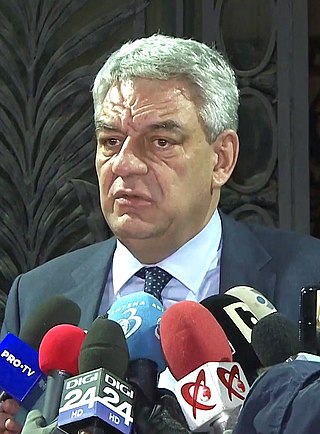
The Romanian component of the 2024 European Parliament election will be held on 9 June 2024. This will be the fifth European Parliament election to be held in Romania.

Nicolae Ionel Ciucă is a Romanian politician and retired general of the Romanian Land Forces, who is currently serving as the President of the Senate of Romania. Ideologically a conservative, he served as Prime Minister of Romania between 25 November 2021 and 12 June 2023 after receiving widespread parliamentary support on behalf of his own party, the National Liberal Party (PNL) along with the Social Democratic Party (PSD) and the Democratic Alliance of Hungarians in Romania (UDMR/RMDSZ). Additionally, since 10 April 2022, he has also been serving as the president of the National Liberal Party (PNL). On 12 June 2023, he resigned as Prime Minister, being temporarily replaced by Cătălin Predoiu.
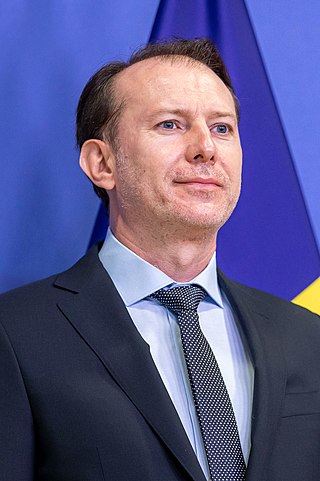
The Cîțu Cabinet was the 131st government of Romania, led by the national liberal (PNL) Prime Minister Florin Cîțu. It was removed from office after a motion of no confidence passed by the Parliament with a record of 281 votes, the largest number of votes on a motion of no confidence since the Romanian Revolution.

Parliamentary elections are scheduled to be held in Romania on or before 21 March 2025, three months after the term of the incumbent legislature of the Romanian Parliament expires. However, the elections are most probably scheduled to be held during late 2024.
A political crisis began on 1 September 2021 in Romania, engulfing both major coalition partners of the Cîțu Cabinet, namely the conservative-liberal National Liberal Party (PNL) and the progressive-liberal Save Romania Union (USR). The crisis also involved former prime minister Ludovic Orban (PNL), who was set to face Prime Minister Florin Cîțu (PNL) in a leadership election during the party congress on 25 September, with the latter eventually replacing the former. Orban would eventually resign from his position as President of the Chamber of Deputies, with him and his supporters subsequently splitting from the PNL, in order to form the Force of the Right (FD).

Local elections are most probably set to be held in Romania in September 2024. They will be the eighth post-1989 local elections in the country. The previous Romanian local elections in 2020 were won by the National Liberal Party (PNL), even though the Social Democratic Party (PSD) came in with significantly more County Council (CJ) presidents and mayors than the national liberals.
The National Coalition for Romania is a big tent grand coalition in Romania, which includes the Social Democratic Party (PSD) and the National Liberal Party (PNL). In addition, this grand coalition supports the incumbent Romanian President Klaus Iohannis as well. The CNR also included the Democratic Alliance of Hungarians in Romania (UDMR/RMDSZ) until its withdrawal from the coalition in June 2023.


